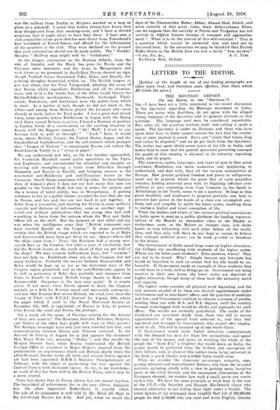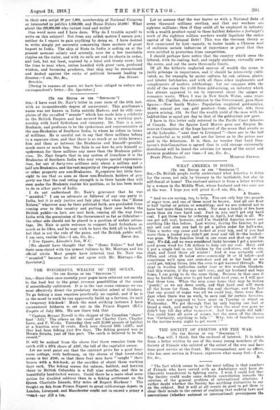LETTERS TO THE EDITOR.
[Letters of the length of one of our leading paragraphs are often more read, and therefore more effective, than those which fill treble the space.] THE MONTAGU REPORT.
[To THE EDITOR or THE " SPEGTATOR."3 have been not a little interested in the recent discussion in the Spectator regarding the Montagu movement in India. There are many who, doubtless, do not agree with the alleged strong language of the Spectator and its general attitude on this question. The language used may be considered regrettable. But, after all, the question resolves itself into calling a spade a spade. The Spectator is under no illusions, and those who have spent their lives in India cannot conceal the fact that the conten- tion of your journal is sound. Facts are "chiefs that winna ding and canna be disputed," and we do get facts from the Spectator. The writer has spent thirty-seven years of his life in India, and makes bold to state that the general ignorance prevailing amongst the people of this country is abysmal in its intensity regarding India and its people.
The numerous castes, languages, and types of men in that great continent, Hindustan, are more numerous and perplexing to understand, and deal with, than all the various nationalities of Europe. How greater political freedom and power or self-govern- ment can be granted, whilst the great blot of caste prejudice remains, holding universal sway with its blighting influence over millions of men extending from Cape Comorin in the South to Baluchistan in the North, seems to me a mystery. So long as this great disability and hindrance to progress prevails, one fails to perceive how power in the hands of a class can accomplish any- thing real and tangible to uplift the lower castes, enabling them to realize a higher and truer conception of life.
When the leaders and chiefs of the various political associations in India agree to meet on a public platform the leading represen- tatives of the Moochi or shoemaker class, or the Dhobie or washerrean caste, or the Mehter or sweeper class, and shake hands in true fellowship with each other before all the world, then, and then only, will there be any hope or reason to believe that enlarged political power can be made possible or beneficial in the future.
The Government of India spend large sums on higher education; the Colleges are overflowing with students of the higher castes. Where are the lower-caste students? Echo answers, where? They are not to be found. Why? Simply because any low-caste boy would be boycotted to such an extent that his life would be un- bearable. If Government made an example of these students they would leave in a body, and so things go on. Government not being masters in their own house, the lower castes are deprived of higher education, though many of them have the necessary merit and capacity.
The higher castes consider all physical work degrading, and the only avenues availed of by them are clerical appointments under Government and in merchants' offices, and the practice of medicine and law; and Government continue to educate a stream of youths, sending them out with M.A. and B.A. degrees, until the country becomes waterlogged with would-be clerks and aspirants for such offices. The results are certainly prejudicial. The ranks of the disaffected are recruited chiefly from those who fail to secure appointments of the special kind referred to, and they feel aggrieved and wronged by Government, who cannot offer employ- ment to all. The evil is summed up in one word—Caste.
If Government would make higher education commensurate with the demand for men for these few occupations, and spend the rest of the money, and more, in teaching the whole of the people the " three R's," a brighter day would dawn on India, the people would be protected from the bribery and corruption of their fellows, and, in place of this canker-worm being universal in the land, a much cleaner and purified India would arise.
When we consider the clamorous microscopic minority, com- prising educated and semi-educated Indians, who form the so-called patriots, agitating chiefly with a view to gaining more lucrative posts in the Civil Service, and the consequent elimination of the European element, we wonder how such a small party can create such a stir. We have the same principle at work here in the case of the I.L.P.—the Snowden and Ramsay MacDonald clique who succeed admirably in not hiding their light under a bushel. The latest figures at my command show roughly that out of 300,000,000 people we find 1,750,000 who can read and- write English, literate
in their own script 59 per 1,000; membership of National Congress or interested in politics 1,050,000, and Home Rulers 50,000! What about the 298,000,000 who cannot read and write?
One word more and I have done. Why do I trouble myself to write on this subject? Not from any selfish motive I assure you; neither do I expect to gain anything by doing so. I have desired to write simply yet earnestly concerning these matters of great import to India. The. ship of State in India is sailing on at the present moment calmly and serenely, save for a few inevitable ripples on-the water, and with its sails set and its *harts in order, • and last, but not least, manned by a loyal and trusty crew; but the time is- near when, unless handled with great care, profound wisdom, and becoming prudence, that ship may be storm-tossed and dashed against the rocks of political ferment leading to [Owing to reasons of space, we have been obliged to reduce our correspondent's letter.—Ee. Spectator.]



























 Previous page
Previous page